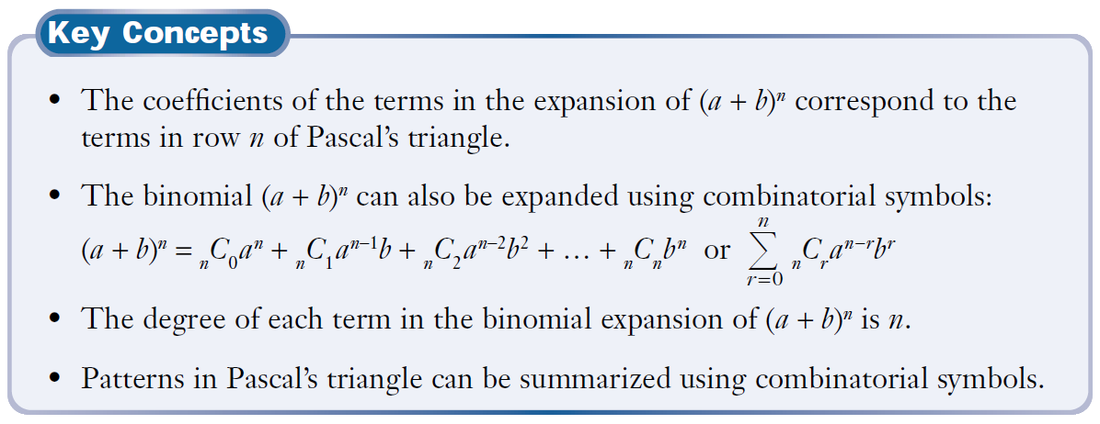1. Given that (p – 1 2 x)6 = r – 96x + sx2 + … , find p, r, s.
Solution
Using binomial expansion,
6C0 p6 + 6C1 p5 (- 1 2 x) + 6C2 p4 (- 1 2 x)2 + … = r – 96x + sx2 + …
p6 + 6 p5 (- 1 2 x) + 15 p4 (- 1 2 x)2 + … = r – 96x + sx2 + …
p6 – 3 p5 x + 15 4 p4 x2 + … = r – 96x + sx2 + …
∴ 3p5 = 96
p = 2
r = p6 = 64
s = 15 4 p4 = 15 4 (2)4 = 15 4 (16) = 60.
2. The first three terms in the expansion of (a + b)n in
ascending powers of b are denoted by p, q and r
respectively. Show that q 2 p r = 2 n n − 1 . Given that
p = 4, q = 32 and r = 96, evaluate n.
Solution
nC0 an + nC1 an-1 b + nC2 an-2 b2 + … = p + q + r + …
an + n an-1 + n ( n − 1 ) 2 an-2 b2 + … = p + q + r + …
∴ p = an
q = n an-1
r = n ( n − 1 ) 2 a n − 2 b 2
∴ q 2 p r = ( n a n − 1 ) 2 a n n ( n − 1 ) 2 a n − 2 b 2
= 2 n 2 a 2 n − 2 b 2 n ( n − 1 ) a 2 n − 2 b 2
= 2 n n − 1
When p = 4, q = 32 and r = 96,
2 n n − 1 = 32 × 32 4 × 96
2 n n − 1 = 8 3
8n – 8 = 6n
2n = 8
n = 4
3. Using binomial theorem, find the coefficient of x2
in the expansion of (3 + x – 2x2)5.
Solution
= 35 + 5 (34) (x – 2x2) + 10 (33) (x – 2x2)2 + …
= 35 + 405(x – 2x2) + 270 (x2 – 4x3 + 4x4) + …
∴ The coefficient of x2 in the expansion of (3 + x – 2x2)5
= 405 (-2) + 270
= – 540
4. Find the coefficient of x4 in the expansion of
(x2 – 5x + 12) ( x − 2 x ) 6 .
Solution
(x2 – 5x + 12) ( x − 2 x ) 6
= (x2 – 5x + 12) ( x 6 − 6 x 5 ( 2 x ) + 15 x 4 ( 4 x 2 ) + . . . )
= (x2 – 5x + 12) (x6 – 12x4 + 60x2 + . . . )
5. In the expansion of (1 + x)(a – bx)12, the coefficient of
Solution
+ 12C4 (-bx)9a4 + 12C5 (-bx)8a5+ 12C6 (-bx)7a6 + …)
∴ The coefficient of x8 = 12C5 b8a5 – 12C6 b7a6
By the problem,
12C5 b8a5 – 12C6 b7a6 = 0
∴ 12C5 b8a5 = 12C6 b7a6
∴ 12C5 b = 12C6 a
∴ a b = 12 C 5 12 C 6
= 12 C 5 12 C 5 7 6
= 6 7
Problems Supported by : Sayar Tun Tun Aung
